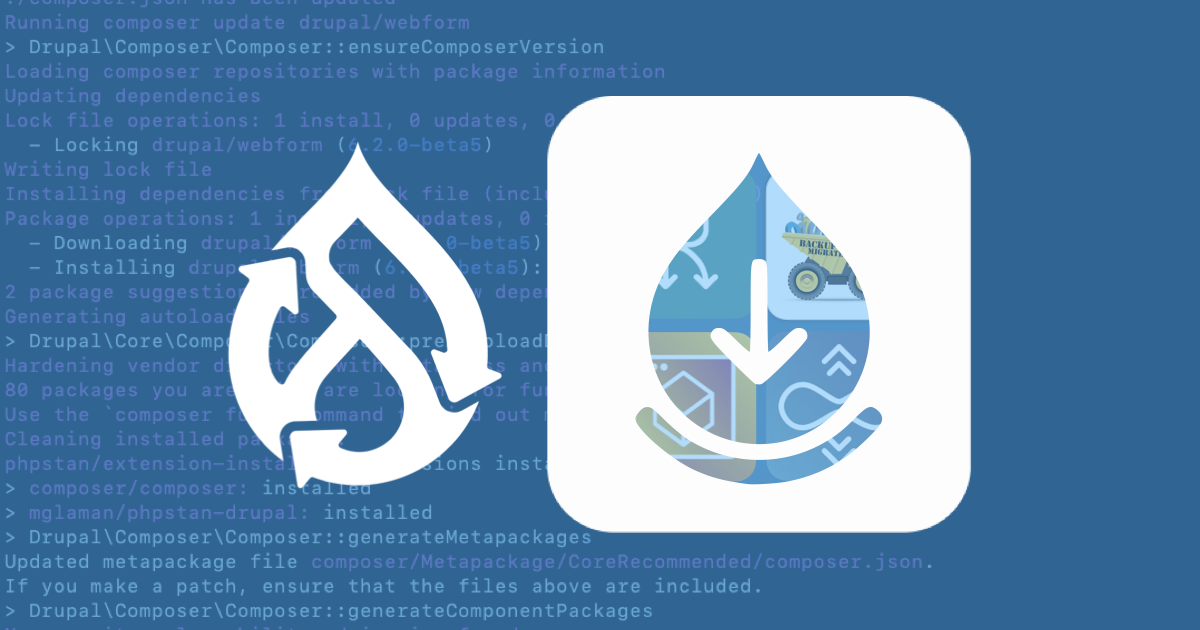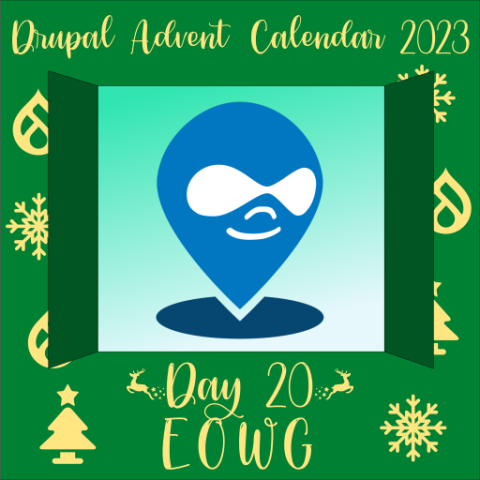Author:
Source
Sponsored:
Atlas of AI: Power, Politics, and the Planetary Costs of Artificial Intelligence - Audiobook

Uncover the true cost of artificial intelligence.
Listen now, and see the system behind the screens before the future listens to you. = > Atlas of AI $0.00 with trial. Read by Larissa Gallagher
This is the second in a series of “Camp Debriefs” by the Drupal Event Organizer Working Group. In this debrief, Fei Lauren (feilauren) interviews Matthew Saunders (MatthewS) about DrupalCamp Colorado 2022. If you would like your Drupal event to be featured in a Camp Debrief, contact the EOWG.
How did you learn about Drupal, and what drew you in?
Matthew had already established a career in tech when he stumbled into the Drupal community over 15 years ago. He was working in the non-profit sector building custom PHP and MySQL solutions. In an effort to branch out and consider the potential for new tooling, he was asked to organize a Think Tank involving a variety of tech professionals and areas of expertise.
“We all just got together to talk about where this crazy thing The Internet was headed.”
Enter Drupal, stage left.
“I sat there sort of in amazement as they went through Drupal, 4.5.1 or 4.5.2… I thought to myself looking at this, wow, I never have to write another authentication system ever again!”
Not long after that, Matthew was attending the first DrupalCon in Barcelona. He was able to meet and share ideas with Dries, Moshe and some of the other folks who are known as the “Elder Statesmen”, so to speak. Drupal has been a hub of his career ever since.
What are you most proud of?
Two things. Well, technically three.
Matthew was on the team that moved Examiner.com from ColdFusion to the soon to be released Drupal 7. At the time, it was the largest Drupal 7 migration in the history of Drupal.
“I think we ended up writing about 18% of Drupal 7”
Matthew also sat on the Drupal Association Board of Directors for about two and a half years. But there is another important accomplishment in his career that he is also extremely proud of – the reason we are all here, reading this blog – his work in establishing DrupalCamp Colorado.
How was DrupalCamp Colorado born?
Originally, it was never meant to be such a large event. It wasn’t even meant to be a web camp. It was a meetup hosted by an agency in Boulder.
“It was a bunch of nerds sitting around a table showing each other things that they’d worked on and you know, having a couple of cold adult beverages and eating pizza.”
Four or five months later, the casual meetup turned into a very small web camp with only about 20 attendees. The camp grew from there until 2011. DrupalCamp Colorado’s organizers were also part of the organizing committee for DrupalCon, so when Denver was announced as the host to DrupalCon 2012, a lot of people tuned in. That year there were about 600 attendees at DrupalCamp Colorado. The following year, DrupalCon Colorado had about 1400 – and it was the last community-driven DrupalCon. Professional consultants have been involved ever since.
Building momentum like that is no small feat, how did it happen so quickly?
20 attendees to 600 is no small feat, but it didn’t happen overnight.
“It was 6 or 7 years to get up to that point. And fortunately… many of us were working for Examiner at that point, so we had some pretty remarkable resources behind us. And a whole lot of support in people like our CTO, Michael Meyers.”
Matthew also mentions how many organizers were putting in full time hours in order to hit deadlines successfully. I think an important takeaway for new organizers is that a successful event with 20 attendees is still a successful event.
What would you say are the most impactful things that we, as newer organizers, could be doing to help breathe life into our initiatives, into our camps, into our events?
“A big part of it is early planning.”
Especially when working to establish a new camp, many volunteers and attendees will likely learn about it by word of mouth. Leaving lots of time for people to plan and promote is really important.
Finding a venue is also challenging, but again, working with potential venues is much easier to do when there is a lot of lead time. You are much more likely to get something inexpensively or even free if you give the venue lots of time to plan. Try reaching out to a charter school, Matthew suggests, as most of what they do is already community driven. But schools in general have fewer rooms occupied in the summer, and all the equipment a camp might need is already in place.
What are some of the things that were initially a struggle, but are now not an issue at all?
There are so many resources that exist on drupal.org – use a recipe!
Hearing this answer, it certainly doesn’t seem like rocket science. But just like following a recipe in a kitchen, the first time can still be challenging – that’s okay. A recipe still gives you a significant boost. Don’t try and reinvent wheels if you don’t have to!
Once you get used to following a recipe that works for your event, “you don’t even have to think about it at the end of it. You’ve got a camp that is just gonna run itself because you’ve broken it up into bite size chunks”.
Okay so, maybe it doesn’t really run itself but it’s difficult to argue the benefit of knowing the steps and making sure you have all the ingredients lined up in advance.
For you, what is the best part about organizing?
Matthew offers two things.
“We always have a really good party at the end, and it’s sort of a it’s sort of a release for all of the for all of the organizers”
And the second is a bit more of a ubiquitous reply among organizers – “the camp is a way of giving back”.
2022: The great hybrid challenge – tell us more about how this went.
Hopin, Zoom, StreamYard – there are so many tools out there, what has worked for you?
“Don’t try to do it with Zoom or something like that. Make sure that you’re using a tool like Hopin”.
Hopin is expensive at a glance, but there are things that can be done to bring that cost down. As of now, they sell annual subscriptions which can be quite costly. But you can pay monthly and pause your subscription. There may also be potential to collaborate with other Drupal web camps and events to lower the impact on a single event (as long as there is a single admin coordinating).
Even if you do pay for an entire year (somewhere in the range of $1000), they also provide a lot of features out of the box – including the ability to offer virtual spaces for any of your potential sponsors. Such as any that might be willing to cover the cost of Hopin.
Additionally, Hopin provides other features that really add up. A “ready made” structure for virtual events out of the box with automatic recordings for sessions means less work before and after the event. The friendly scheduling interface for users and presenters means everyone knows where they need to be while the event is running. Registrations are easier too, they even offer payment handling.
If you have ever organized a camp or any large event, you know how much work it is. So this next piece of advice is important. Matthew warns, “Expect to have twice as much work. You’re doing two events. We used Hopin, but we also had our physical venue.”. It’s twice as much work but you don’t have to schedule full days – they tried out half days it helped a bit, he reports.
But is it worth it? I guess that depends on resources, but if the option is within reach it certainly seems so.
“We actually ended up with some amazing content last year and it’s because our participants ranged from all over the world. We ended up with several people from India who presented. We ended up with lots of local people. We ended up with people from all over the United States, Canada, all over Europe.”
Attendee engagement. One of the most ubiquitous challenges of hybrid events. What can you share with us about how you have addressed this?
When we talk about hybrid challenges, many of us might imagine trying to solve problems that help restore engagement to where it was previously. Matthew’s insights really illustrate how important it is to consider our definitions of “inclusiveness”.
“I would not have been able to attend. I can’t attend events. I am really glad you did this.”
Resident of Alaska
With people pouring in from all over the world, it’s not just a matter of keeping the doors open for those who live in and around Colorado. Hybrid events provide an opportunity for inclusiveness that can’t otherwise exist. With 12 attendees who were in India including two speakers, the question Matthew and many other organizers seem to be asking is not should our events continue to be hybrid or remote. It’s how do we keep improving the hybrid model, and what other advantages exist?




